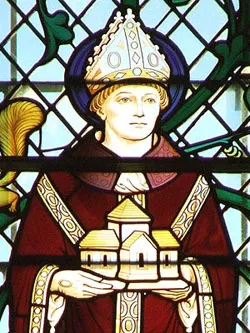SAINT BERNADETTE SOUBIROUS

SAINT BERNADETTE
Also known as:
Maria Bernadette;
Marie Bernarde;
Sleeping Saint of Nevers;
Bernardette;
Bernardetta;
Bernada;
Bernardette Soubirous
Bernadette Soubirous was born to Francois and Louise Soubirous on January 7th 1844. At that time the family were living in the Boly Mill and Francois was running the mill. The Boly mill had belonged to Louise’s parents, however when her father died suddenly, her mother brought in Francois. Originally Francois was to marry the eldest girl, Bernarde, however he fell for the younger daughter Louise. They were married in a civil ceremony on November 19th, 1842. The church wedding was delayed until January 9th, 1843 due to the death of Francois mother. Bernadette was baptised on January 9th, 1844 as Marie-Bernarde, but she would always be known as Bernadette.
However soon after the birth a tallow candle set fire to Louise’s breast and she was unable to care for Bernadette properly. For eighteen months Bernadette was sent to live with a wet-nurse, Marie Lagues, who lived in Burg House in the nearby village of Bartres. On April 1st, 1846, Francois brought his daughter back to the mill. At this stage Louise was expecting another child, which was born on September 17th, 1846. The Soubirous and the Casterots (Louise’s family) were now living in eight rooms within the mill. This created so many problems that, in 1848, the grandmother left with her other children and went to live with her eldest daughter, who was now married.
At this stage Francois and Louise went to work. However without the grandmother’s knowledge, and through being too soft with their customers, the money soon ran out. A further complication was the new steam-powered mills that were becoming prevalent.
Over the next few years things were not to get any easier for them. In 1849 Francois was blinded in one eye by a chip of stone. In January 1851, their young son Jean-Marie died. However in May the same year another son was born, and he was named after his late brother. In 1852 the mill was sold. It was hoped that the new owner would get the Soubirous to work it, however he did not. The Soubirous still lived there but Francois needed to find another job. In June 1854 the family were forced to move out as they could not pay the rent.
At this time the Soubirous fell hard. There was a cholera epidemic in Lourdes in 1855. While Bernadette survived she was left with chronic asthma. The same year Claire Casterot died. She left the family nine hundred francs and they used this to rent the mill at Arcizac-ez-Angles. In 1856 the harvest failed and this meant eviction for the Soubirous family. They moved to Rives House however they could not afford to live even there.
In 1857 they moved into the Cachot. That was the punishment cell in the disused prison of Lourdes. It was lent to them by a cousin purely out of kindness. The whole family went to work in an effort to survive. Francois became a labourer, Louise a cleaning-woman. Bernadette looked after her brothers and sister, while also collecting bones and scrap iron for the local rag-and-bone woman. She also helped out in her aunt’s tavern. Even still the family could barely make ends meet. Indeed the whole area was affected and Emperor Napoleon III had sacks of flour distributed.
In 1857 the baker Maisongrosse accused Francois of stealing. He was arrested and imprisoned. Despite the fact he was released after a week through lack of evidence, he returned to the Cachot as a broken man. He was now disgraced publicly and was seen as little more than a pauper accused of stealing. In September 1857 Bernadette returned to Bartres to work as a shepherdess for her former wet-nurse Marie Lagues. This was mainly in order to lessen the load at home. Despite the fact she was now in her teens she could still not read or write. This was mainly due to her ill-health and the fact that she was not a regular pupil at the school. Despite this she had been promised she would be allowed to prepare for her First Communion.
Bernadette was very homesick while on the farm. Every day she would mind the sheep and by night Marie Lagues tried to teach her the catechism. However, as Bernadette spoke only the local dialect, she had great difficulty with the French in the Catechism. These sessions would often end in tears. In January 1858 she persuaded her parents to let her return to Lourdes while using the excuse that Monsieur le Cure wanted her to prepare for her First Communion.
On returning to the Cachot at the end of January, she began attending the paupers class at the hospice run by the Sisters of Charity of Nevers.
On July 7th, 1866, Bernadette arrived at Saint Gildard’s Convent in Nevers. She always said that she came to Nevers to hide. The day after she arrived she was brought in front of the whole community of Nevers in order to tell her story. Having done this she entered into silence. The mistress of novices, Mother Marie-Therese Vauzou, decided to treat Bernadette twice as hard as all the other novitiates. She made sure that all displays of pride in Bernadette were quashed.
On July 29th Bernadette donned her nun’s habit as Sister Marie-Bernard. However she soon fell ill and was brought to the infirmary. She deteriorated rapidly and, on October 25th, she was close to death. The bishop of Nevers, Monsignor Forcade, administered Extreme Unction and Bernadette took her vows in advance. The next day she was much recovered and declared that she was out of danger. Although she was severely chastised she was allowed to keep the veil. On December 8th, 1866 she learned of her mother’s death.
Bernadette returned to the novitiate on February 2nd. She returned to her training but never complained at the severity of the mistress of novices. “Mother Mistress is right….. because I am very proud…. I shall work at trying to improve myself.”
Bernadette renewed her vows on October 30th, 1867. While all of the other newly professed nuns were given duties by the bishop and Mother General, Bernadette was not given a duty and merely told she would remain in the Mother House. The bishop had assigned her the task of prayer. She became an assistant to the convent’s nurse, Sister Marthe Forest. However in 1870 Sister Marthe fell ill and was bedridden until her death.
At this time Bernadette had serious responsibility. It was the first time such tasks had been placed upon her and she coped admirably. By all accounts she was an excellent nurse in catering not only to her patients physical needs but also talking to them and helping them to recover. Indeed in modern Lourdes that is a major part of the care of the sick, merely paying attention to people and talking to them is treatment in itself. In July of 1870 France declared war on Prussia. the Mother superior of the convent put the convent and all its residents at the disposal of the Ministry of War. The infirmary was turned into a military hospital. All of this time Bernadette was in regular contact with her father. However on March 4th, 1871, he died.
Bernadette’s answer to this was to throw herself even further into her work. Two years later her own health began to worsen. She suffered a relapse in January 1873 and was confined to her room. In June that year she received the Extreme Unction for the Third time. In October she was officially relieved of her duties. Once she fully recovered she was returned to her original post of assistant nurse. Bernadette found it difficult to adjust to this new situation. In April 1875 she took to her bed again, from then on she was to remain a permanent invalid.
In September 1877 Father Peyramale died. When Bernadette heard this her reaction was “It will soon be my turn now”. It would be two long years before this prediction came true. in those two years she suffered constantly. The Extreme Unction was administered to her for a fourth time in March 1879. On Wednesday, April 16th, 1879 Bernadette asked to be lifted from her bed. She made her confession, then recited the prayer for the dying. She asked for a drink of water and, having sipped this, she made a sign of the cross, bowed her head and died.
rosary.team
















